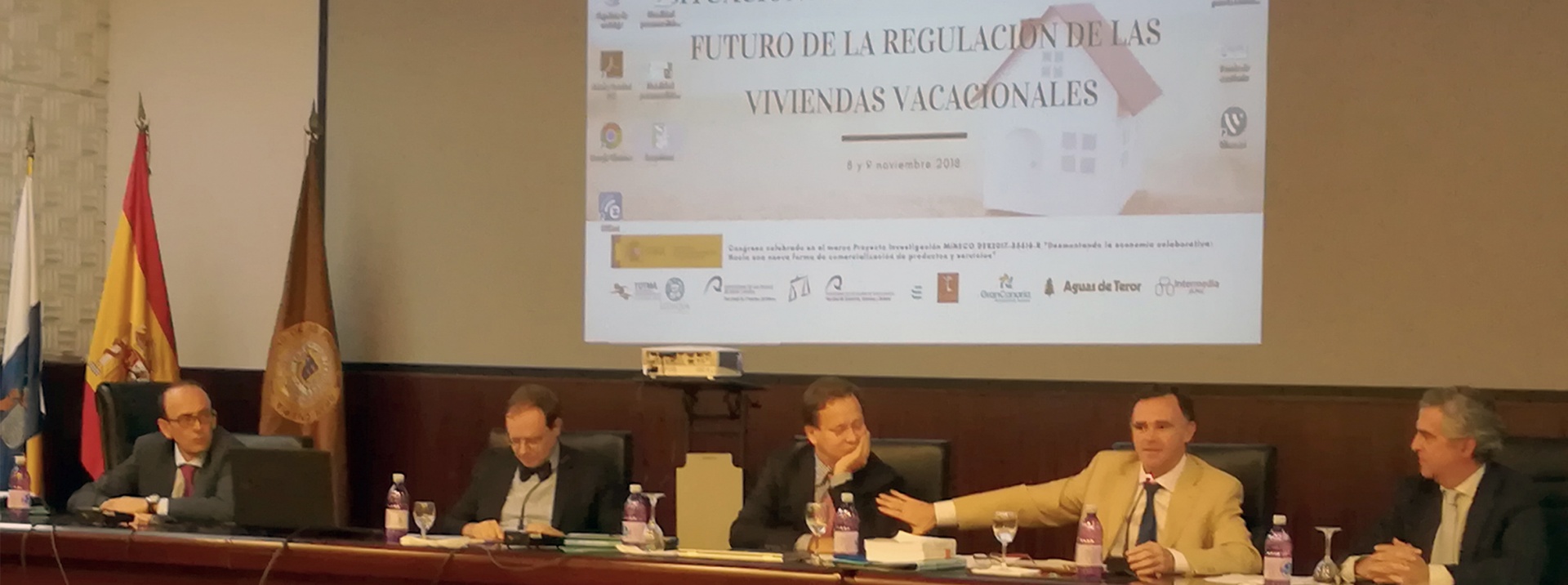Given the lack of resources of regional and local corporations, jurists point out that citizens must be made aware so that they dare to denounce irregular situations in order to avoid tax fraud, gentrification and a change in the cultural identity of the neighbourhoods, and that on the other hand a change in the current legislation is urgent.
More than 30 experts have debated the current legal situation of holiday tourism during the First International Congress on Collaborative Economy organized by the TOTMA Group of the University Institute ECOAQUA.
Controlling the illegality of holiday renting and arriving at an optimal legal regulation that is effective and content with the different interlocutors of the sector is something that is surpassing the public administration by not having sufficient resources. This is what numerous jurists and experts in the holiday tourism sector agreed on today, during the 1st International Congress on Collaborative Economy which has been taking place since yesterday at the Faculty of Legal Sciences (FCCJJ) of the University of Las Palmas de Gran Canaria (ULPGC), and which is organised by the Tourism, Spatial Planning and Environment Research Group (TOTMA) of the ECOAQUA University Institute.
It is for this reason that this group of speakers explained that it should be the citizens, in the first place, who take action in the matter and dare to "denounce" the exploitation of these irregular homes, in order to prevent tax fraud, gentrification and the change of the cultural identity of the neighborhoods, and that it is also urgent to change and improve the current decrees that are regulating the sector.
According to Humberto Gosálbez, professor of Administrative Law at the University of Córdoba, the problem that the administration is currently facing is due, firstly, to the fact that it does not have enough tourist inspectors, secondly, to the fact that it has not integrated a group of expert jurists in the sector to develop effective legislation, and thirdly, to the fact that it does not integrate guarantors of the system.
"In Madrid or Barcelona, some pilot programs are working, such as web portals of denunciation of the administrations or the hiring of pollsters to sound out irregular situations in the neighborhoods with the neighbors. Also the private associations have developed reporting models easy to complete to present at regional level that are easily downloaded on the Internet," he explained, and noted: "this phenomenon has exploded so that governments have not reacted by adopting appropriate measures, so in this situation are the citizens are the ones who must take measures to combat illegal tourist housing if they want to protect their environment.
Fabrizio Fracchia, professor at the University of Bocconi in Milan, agreed: "The reality of the current situation is that not only has the distribution of competences between the State and the autonomous communities been doubtful, but the current legislation has not measured well the balance of the different interests involved (at fiscal, civil and tourist level).
"Everything should have started from a correct urban planning and a differentiated and proportional regulation should have been made that took into account the weight and interest of the different actors", he added. In this sense, he pointed out the differences between holiday platforms, tourist accommodation companies, homeowners, professionals related to the operation of tourist accommodation, victims' groups (tourists and neighbours) as well as the different administrations involved.
Fracchia explained that the situation in Italy is similar because the explosion of business with vacation rental platforms has been fulminant, and this has led to "administrative intervention and legal regulation has been done late, and that controlling it optimally is being difficult.
Wide-ranging debate on regulation of the sector
The I International Congress on Collaborative Economy closed this afternoon with the intervention of Rafael Robaina Romero, rector of the University of Las Palmas de Gran Canaria; and Felipe Afonso El Jaber, first deputy of the Deputy of the Common.
This forum, which brings together some thirty academics from various Spanish universities and legal experts and professionals in the sector, has had six panels in which different perspectives of holiday tourism have been discussed: 'Holiday homes: between the collaborative economy and commercial activity?', 'The question of competence from the public and private perspective', 'The measures adopted for the regulation of living conditions in the Canary Islands', 'The measures adopted for the regulation of tourism in the Canary Islands', and 'The measures adopted for the regulation of tourism in the Canary Islands'.


